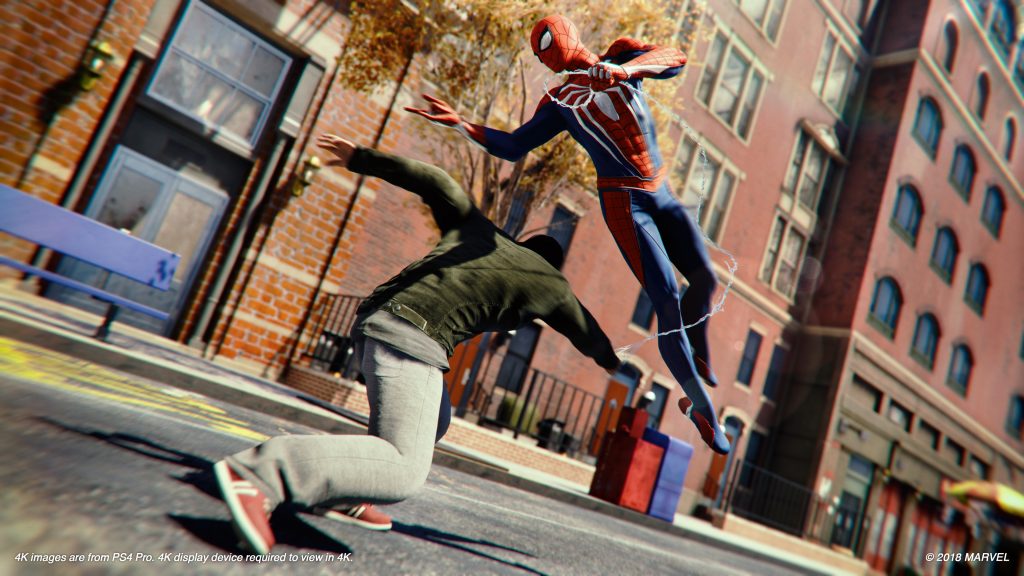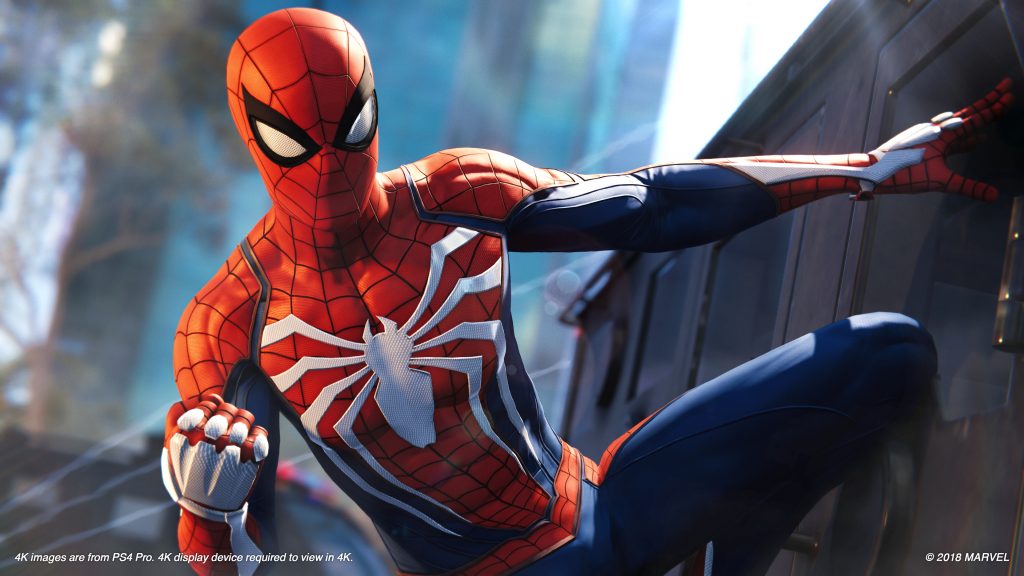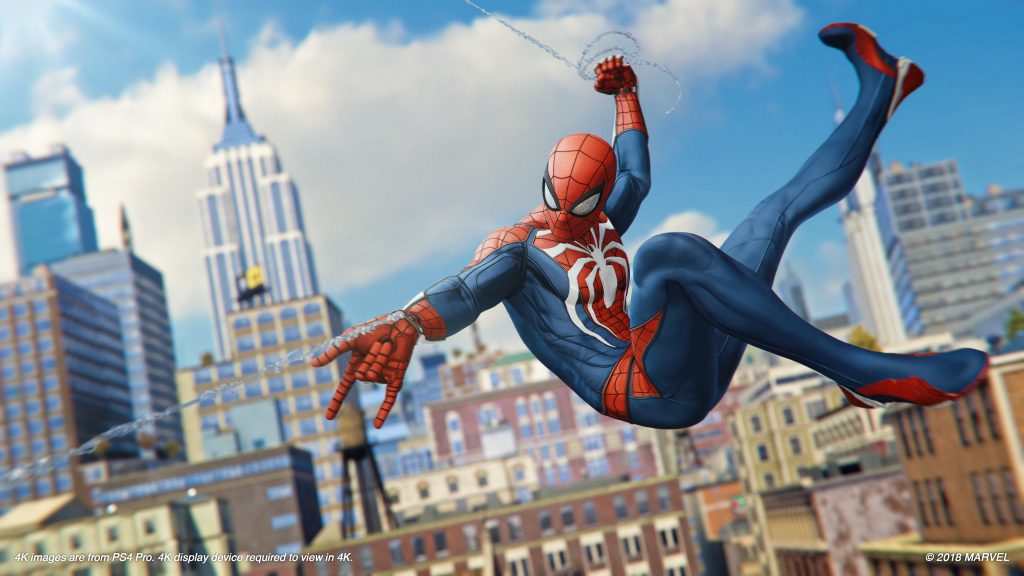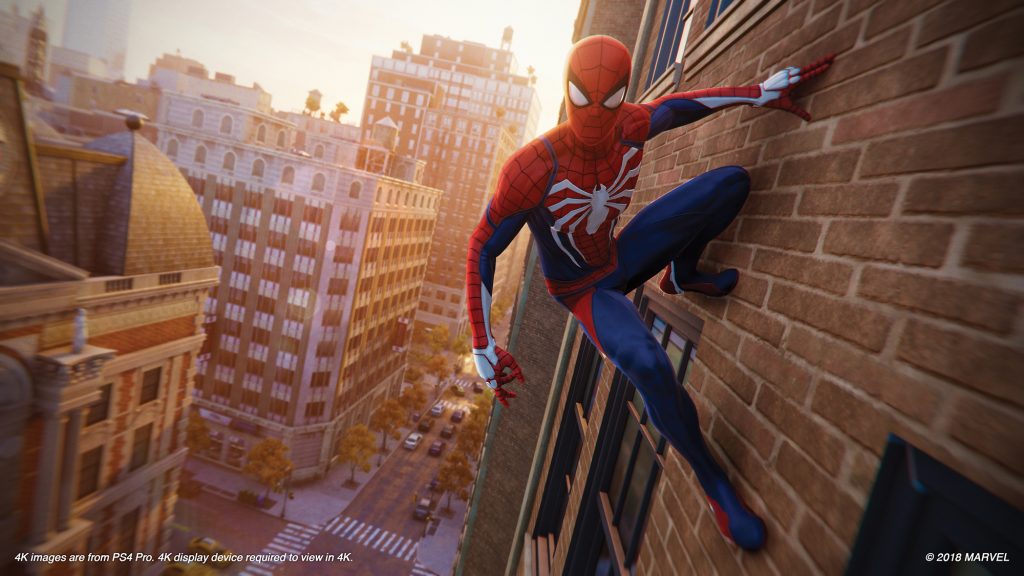A Chat With The People Behind PS4’s Marvel’s Spiderman
THE MARVEL EMPIRE’S COLLECTION OF TIGHTLY CLOTHED SUPER HEROES SEEM TO BE TAKING OVER THE BIG SCREEN AT THE MOMENT, BUT IF YOU PREFER YOUR MASKED CRIME FIGHTING CATHARTIC ESCAPISM TO BE OF THE MORE INTERACTIVE KIND, YOU’LL BE PLEASED TO KNOW THAT SONY INTERACTIVE ENTERTAINMENT, INSOMNIAC GAMES, AND MARVEL HAVE TEAMED UP TO BRING THE WORLD AN ORIGINAL SPIDERMAN GAME STARRING A MORE EXPERIENCED PETER PARKER AND ONE OF THE MORE RECENT VILLAINS FROM THE FRANCHISE’S 50 YEAR HISTORY.
To promote the release of the game on the 7th of Sept, Insomniac Games’ community Director James Stevenson is in town. To start the interview off I present him with the latest issue of M2, which features Henry Cavill on the cover. Otherwise known as the man who plays Superman from Marvel’s arch rival’s, DC. I had completely overlooked the fact that I had given the developer of Marvel’s Spiderman a copy of a magazine with DC’s Superman on the cover as a gift, until he mentioned it with a quizzical look on his face. Luckily, I smoothly changed the subject.
Sooo… Do you think Henry Cavill would be a good Bond?
I don’t know. It’s like Mission Impossible is a better James Bond than James Bond is now, in some ways. They have all the crazy gadgets, all the crazy stunts. I also didn’t love Skyfall as much as other people did.
It went a little bit crazy under Pierce Brosnan though.
I think Golden Eye was probably pushing it a little bit but I still love Golden Eye, and then they kept going further and further. Then I feel like Casino Royale was OK, it’s almost like they dialled it back too far and they haven’t been able to find it. Spectre wasn’t very fun – James Bond always had a funness to it. Gold Finger has him locked down and there’s a laser and there’s a weird sense of fun playfulness that they lost in the last few. That franchise is kind of out and it’s still making decent movies, don’t get me wrong, I still enjoy them when I go and see them, but they haven’t really nailed it in a long time.
Is it an audience thing? As a consumer base have we lost that humour? Are we more into the darker stuff?
I don’t know, it’s a good question. Maybe James Bond isn’t politically correct anymore as a character. How do you view a character that is so incorrect? You watch his old movies and it wouldn’t fly today. Maybe it’s just nostalgic, maybe it’s the baggage of all these movies and Sean Connery and so many actors who have done so many things, it’s tricky.
Awkward segway on to Spiderman, but when you’re dealing with something like that which has so much legacy and so much expectation around that, is there a weight on your shoulders?
Yeah, it’s like with great power there must also come great responsibility. You have one of the most beloved characters in the world. It’s like Mickey Mouse, there’s not many characters as well known around the world and is as loved as Spiderman is. You have an amazing amount of characters and stories and stuff to draw on when you’re making something new but then you also have crazy expectations for how good it needs to be and what people expect and how great previous Spiderman stories have been. The bar is very high and fans are very demanding for Spiderman to be great. There’s a lot of advantages and then there’s a lot of pressure that we’ve felt in working on it and trying to create a new original Spiderman universe and an original story and respecting that franchise DNA and the characters’ DNA, but also surprising people and putting some new twists on it.
Is it harder or easier to create your own universe with that DNA?
It’s both. There are advantages and disadvantages. From the beginning we knew we had to do our own, we wanted to do our own thing. We were going to make the Spiderman we wanted to play first and foremost and if we wanted to play a game, we wouldn’t want to replay a movie storyline or something. We wanted to play something original and new that was created for video games. That was very much right at the beginning. You have a lot of problems that are solved right off the bat. You know who your character is, you know what his character traits are, what he does, generally what we should be able to do in combat. He’s going to be in New York; very quickly you’re able to establish a lot of things. Then you say ‘How do we surprise people within the constraints of the character and that world?’ So you have new challenges you have to figure out too because you have 50 plus years of comics,movies, cartoons, all sorts of Spiderman media out there. We have a lot of great Marvel games and working very closely with them and they’re very passionate about it. Bill Resmond, the Creative Director there, he loves Spiderman so much he named his son Peter. You have really great resources available to us to help make that happen.

As you say, you’ve got 50 years’ worth of legacy to draw on and there are new characters right up into the last few years that you can choose from as well. Did you have to set some perimeters around that in terms of what you’re trying to do and what you’re drawing from?
It’s almost hard to narrow it down, there are so many. We chose Mister Negative pretty early on. He’s one of the key villains because one of the first things we kind of focused in on, Bill Resmond from Marvel said ‘The best Spiderman stories are when Peter and Spiderman’s worlds collide’. We made that a big focus and pillar for the game. Mister Negative was a relatively new character, the last ten years or so, created by Dan Slott. Dan Slott was a consultant on the game in the first few months. We were kind of sketchy on the initial story. The idea of Mister Negative being kind of fresh; if you haven’t read the comments, you don’t know him so that’s fun for a lot of people. But also that his alter ego is Martin Li who is this philanthropist; he runs all these homeless shelters in New York, he’s a really good guy and Aunt May works for him at these shelters. You can imagine the horror for Peter when Spiderman is chasing this guy down and discovers Mister Negative, who is running this new gang in the city, is Aunt May’s boss, this guy I know who is a really good guy but he’s running a gang. What do you do with that and how does Peter’s world react to that?
When you were describing that, you get the sense that you’re describing the process of working on a story structure for a screenplay or a movie. Do you feel like there’s an expectation for more cinematic experiences now in gaming?
Look at the games Playstation has published. Look at the bar that Naughty Dog has set with Unchartered and last one was Unchartered 4 to Unchartered: The Lost Legacy, look at Horizon Zero Dawn, look at God of War, look at Detroit: Becoming Human. There’s this very rich lineage of these great story-based games. I think people’s expectations for Marvel storytelling are through the roof. In general, you have these incredible Marvel stories that people are consuming, whether its in comics or in many cases when they go to the movie theatre, and they see the way that these stories are being told in a way that they would never have imagined 20 years ago. We knew we had to live up to that blockbuster experience that people are expecting both from the best Marvel stories being told out there, but also the best video game stories being told. Hopefully people walk away going ‘Oh, I didn’t know you could do a super hero game or a Marvel game like that.’
I’d just had a daughter at the time, so maybe I was emotional anyway, but I think Last of Us was the first time that I almost cried during a game. That level of immersion, is that something that you really put into it as well and being able to create that immersion that is just so much deeper.
I feel like we put good heart in our games. Ratchet & Clank: A Crack in Time was one I was really proud of in terms of the heart of that story. I think there is a lot of heart in Resistance 3. Elevating the story telling level and getting better and going beyond what we’ve done before. Then also bringing you a story with even better performances and better characterisations, landing on something that will actually move you.
To us, this is not just a super human story, it’s a human story. Getting down to these people, who they are, who Spiderman is behind that mask and who the people are in his life and the relationships in his life both with Mary Jane, Aunt May, his mentor Miles Morales. Making those relationships matter to people is really important and where the emotions will go. I don’t want to get too in-depth on it this point but I think we have some emotional beats in there, that’s for sure.
For some reason YouTube in the gaming world really loves side by side comparisons. You’ll see the 2004 Spiderman 2 versus what you’ve got coming out now. Obviously the graphics and the performance are worlds apart. What are you looking forward to in the next ten years in terms of being able to create the games and tell the stories that you want to tell? Are there certain hurdles that you’re going to break through?
I think the Uncanny Valley is a big one that everyone has tried to with varying levels of success. I think in some cases it has been crossed and in other cases it’s close to being crossed. We’ll see how that plays out as time goes on. The other thing too is the tools and sets we had to make these sort of things. You imagine where we were ten years ago where no one was doing the amount of motion capture and facial capture and the real time nature.
We didn’t build games in real time like we do now. You could have never built this city the way we did now because you’d make changes and you’d have to wait an entire day to see the change to the game. To build a game this big with this much storage could not have happened. I think as tools continue to get better and allow us to do more things, the level of fidelity, not just in what we’re trying to present but what we’re able to capture in terms of characterisation, could be really interesting and special.
It’s also challenging because you need more people than you ever had before. This is the biggest project we’ve worked on by a big margin. A lot of people working on it, it takes a whole village.

What sort of numbers are there?
Like 250 employees working on it. That’s just Insomniac, there’s certainly a lot of work from Sony and various people up in the Sony side and other people creating assets for us. And then Marvel Games, their brain trust being involved. It takes a village for sure and a lot of people are trying to help us get this one really right. It’s great to have lots of ideas and lot of stuff when we’ve always had such a collaborative culture. It’s good to have everyone pushing us to do our best.
From a business perspective, is it hard to maintain the culture that you want when you have to scale up like that?
It’s definitely evolved. It’s interesting, we have a culture that I think has evolved over the last 10 to 12 years as the company has grown larger but I think it still has some of the same tags on it. It’s a little bit bigger, it’s not an office of 50 people anymore where you know everyone’s name and their significant other’s name and their kids’ names. It’s a little larger than that and there are more layers of separation between people. But that said, I think the general ideas of anyone can make an impact and anyone can have an idea and you can approach anyone. Ted Price’s door is open all the time and you can just walk in and have a conversation with the CEO; walk up to the Director of the game and have a conversation with them. There’s no barriers, there’s not a rigid corporate structure in place inside of the studio. It’s very open and collaborative across all disciplines and people intermixing. The best ideas come from anywhere and even within that, we’re also very open to the outside in terms of trying to be very interactive with the fans. When they’re looking at this stuff, they’re talking back to us and we’re trying to think about what they have to say. Sometimes they spot stuff that either was a bug or was broken or they spot stuff like ‘Why don’t you guys have this?’
Honestly, sometimes we’re not going to have that ability, but some programmer reads that and decides they think they can make that and works up a prototype, then they’re like ‘What do you think of this?’ It’s pretty cool and we find a way to schedule it in and put it in the game. That’s literally happened in April this year when we put the first major cover story out. We’re like ‘This ability is not in the game,’ and people were like ‘We want that though,’ and someone else said ‘Yeah, I want it too, I’m going to make that’ and away they go.
I wouldn’t call it start-up, people will do spectacular things inside the studio and do certain stuff and make things happen. It’s a culture we haven’t lost over all these years but the other thing that I think is great about the culture is it’s very work/life balanced too. We want people to turn in, take time with their family and have a life too.
Game development is a tough thing, I don’t think we’re perfect by any means. But we do work really hard to try and get people to be able to make video games but also have a personal life and family life too.
Do you manage to do that personally?
Yeah, it’s better when we’re not shipping the game but everyone has their busy times. This is day 23 on the road I think, so I’m looking forward to going home. For the most part, totally. I feel I have a really good balance and shipping this game requires a little bit more time, but it’s also a really fun project to work on. So it doesn’t really bother me that much to put in all the extra hours to get this thing across the finish line.

When you’re not on the road, is there an average day for you?
No, there’s no average day. We’re still small enough that there’s always something different. Whether it’s dealing with our fans, livestreaming – because we livestream five days a week from our studios and play our games, other people’s games, talk to fans and people out there. Sometimes it’s looking at Spiderman stuff and sometimes it’s all day meetings with Marvel and Sony. That’s what I like about it honestly. I don’t just go in and do the same thing every day, every day is a little bit different. Whether it’s getting a new trailer ready for Comicon or planning stuff out with Marvel and Sony or livestreaming or spending time on Twitter or Discord talking to our fans; there’s always something different about each day. Each day comes with its own surprises which is fun.
Is there a certain career pathway that someone needs to take in order to get into your position?
No, I guess it’s more established now. It’s so different in every developer. I guess in a bigger publisher, there’s maybe more rigidity and corporate structure to it, but a lot of it is building community at some level. People who run big fan sites and build people around them find themselves secretly acquiring the experience they need to do an entry level version of the job.
When you look for folks to do this sort of thing, can you create content in a way that’s meaningful and rallying people around conversation and build a positive culture around the conversation and the people you have? I think that’s the soft answer of it. You see a lot of folks who are part of a community and build communities within larger game communities. They’re the type that find their way actually starting to work at the developer, at the publisher, doing the same thing because they have done it well and proven they can do it well.
That’s the video game environment as a whole. You hire someone to animate, who knows how to animate and has proven they can do it. You find an artist who does art that you think ‘This is the type of art we need and you can do the type of art we’re looking for.’ You hire a programmer who can write the code and you hire some of the build community who you know can build that community or you believe can build that community depending on where we’re starting.
You see game externalists do a lot and in some ways they kind of have the same thing. They’re more creating news and people come back to read it every day and have discussion around it. I think that’s why some people want that around. But more and more these days you find people who have created their own pocket of fan community and they talk about a game or a topic a lot and they have a lot of people that follow them and interact with them and that’s a good starting point.
Does it feel like a community in terms of the wider industry as well? How do you get on with other developers?
Great. There’s a meet-up that I’m missing this month because of this trip, it’s happening the day after I get back and I’m going to sleep that day. It has folks from Naughty Dog, Marvel Games, Trade Ark, Santa Monica, a lot of LA developers who are very friendly. Arnie Myer from Naughty Dog and I have been friends for a really long time and have sometimes been on the road together doing the same six weeks of events back in the day. We saw each other more than we saw anyone at home because we were always in the same hotel, same events.
It’s fun because there are so many people out there and a lot of the other developers we get to see all over the world at different places and so we’ve hung out in all sorts of weird circumstances in different cities and different strange bars and different convention centres. There’s a lot of comradery. Sometimes in the thick of production, it’s hard to do that but when we’re in the earlier stages, we try to take that time to meet up with other developers and share pipelines like ‘How are you doing this? Have you guys found anything interesting?’ and taking from that.
Even accessibility has been one thing that we’re working on and Naughty Dog has done a tremendous job at building accessibility into their games. They gave us a tonne of learnings that they’ve had. Being able to go to Sony and saying ‘What are your other studios doing?’ and getting that knowledge, lets us jump ahead in our knowledge and base where we’re trying to do something.
Some people are passionate on the team, they really want to make it happen but maybe we don’t have all the expertise. Whereas other people have already gone through it and are pathfinders so we can avoid some of those pitfalls and, I wouldn’t say catch up, but certainly catch up more quickly by relying on developments that have already been made.

What about demographic? I turned 40 last week and I’m still obsessed with gaming but I’m wondering if I need to hide the PS4.
No, I understand that attitude. It’s funny because when I started playing video games on the NES Nintendo, that was like a VCR and it was acceptable, everyone in the family played. At some point, it wasn’t cool to play. There was a weird period. Maybe it was just because video games were so heavily marketed to 10-year-old boys that it became not cool anymore. You started seeing the advertisements through a different lens.
In some ways the cultural undercurrents in video gaming are still the result of some of that early aggressively marketing to 10 to 12-yearold-boys for a long period of time. I think we’ve moved beyond that. I think it’s gotten to a point now where it’s not uncommon. Everyone plays Fortnite, the whole world is doing it. People in the World Cup are doing Fortnite games. It’s well beyond that. People are playing on their phones, playing on a console, playing on their tablets.
You see the type of content that’s coming out and you see games like Last of Us or games like God of War and people are realising that it’s not stupid, there’s art here and there’s real stories and powerful emotional stuff. That’s hopefully elevating it to where it’s not uncool to have video game consoles or uncool to play video games.
I will be happily gaming hopefully into my late, late years. I look forward to retiring and catching up on all the video games I’ve missed. There’s a stack that keeps growing taller and taller. One of these days.
What’s the best piece of advice you’ve been given?
That is a massively difficult question. Always merchandise your importance. For anyone that’s ever tried to grow their career or do anything, it’s making sure that people above you know what you’re working on and why it was good and what you did was good. Everyone is very busy and if you don’t sell yourself, how are you going to get everything done? If you can’t explain to the people you work for, and probably the people they work for, what value you brought and show them that, then you’re never going to get anywhere. You’ve got to apply that to just about anything in your life. You should always merchandise that importance.

